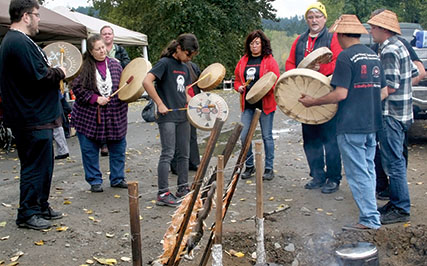Culture
Encampment returns Tribe to shores of Clackamas River

OREGON CITY -- It was raining in January 2011 when the Oregon Department of Transportation closed the historic Arch Bridge for repairs and representatives of the Confederated Tribes of Grand Ronde marked the event as part of the 14-member Willamette Falls Heritage Area Coalition.
Connecting Oregon City and West Linn, the bridge was named to the National Register of Historic Places in 2005 and the repairs would bring the span back in its original style.
Residents from nearby neighborhoods crowded under tarps to see what all the excitement was about during the closing ceremony. They tasted traditional Native foods offered by Grand Ronde Tribal members, the first peoples of the area.
And it was raining again over the weekend of Oct. 14-16 when the Willamette Falls Festival honored the bridge's official re-opening and Grand Ronde Tribal members returned to also mark the event.
The Confederated Tribes of Grand Ronde is an active member of the Willamette Falls Heritage Area Coalition, a group aiming to capitalize on the culture and history of the area and to bring new life to the local communities on either side of the bridge and along the shores of the Willamette River running underneath.
The first communities in the area were settled by ancestors of the Grand Ronde Tribe. They lived in encampments along what has become Clackamette Park in Oregon City. To highlight that history, the Tribe was on hand at the opening to contribute to the historical record. A modern-day Grand Ronde encampment on Saturday offered lessons in Indian history and culture.
"We still have the connection," said Tribal Attorney Rob Greene.
Tribal members keep it alive through events like these, through the Tribe's annual lamprey collection at the falls and participation in the cleanup efforts on the Willamette and Columbia rivers.
Clackamette Park is not much more than a stone's throw from Willamette Falls where, from time immemorial, Tribal peoples have harvested lamprey.
The Confederated Tribes of the Grand Ronde have made growing use of heritage- and community-centered celebrations to tell the Grand Ronde story, through the Chinuk Wawa trade language of Northwest Indians, through the many crafts that Natives have developed over millennia in the area, through stories of the Native peoples who lived here and the foods they ate.
The Tribe also has been a member of the coalition for two years and participated on the planning committee for the Willamette Falls Festival.
On Saturday during the Tribal encampment, Chinuk Wawa teacher Eric Bernando showed one of the language maps the Tribe has developed. He explained that Native languages that barely exist today might be gone entirely in the future.
Jordan Mercier showed baskets he had made and he gave one away.
There was discussion about soaking and drying basket-making materials, and about how Greg Archuleta leaned strips of salmon against wires stretched by the side of the fire in the traditional way.
"There used to be encampments all along this park," said Archuleta to an assembled group of festival-goers. Other bands found homes along Eagle Creek, about 20 miles up the Clackamas River.
Many Portland-area Tribal members are direct descendants of those Tribal peoples who once lived in the area, Archuleta said.
"The Tribe is putting our footprint out here, to educate the community about the ceded lands of the Grand Ronde people," said Tribal Council member Jon A. George.
"It's very nice to see the membership involvement, putting out who we are and how we are interacting in the interest of the larger community. I'm so proud of our Portland group. They're always stepping up to the challenge."
George, before being elected to Tribal Council in September, worked in the Portland office and participated in many cultural activities in the area.
On hand from the Portland office were Greg and Lisa Archuleta and their mother, Elder Bernadine Shriver, and her husband, Doug; Elder Debi Anderson and her son, Eric Bernando; Jordan Mercier and his mother and father, Elder Michael and Tammy Mercier; Elder Dolores Parmenter; and George's sons, Trey and Tynan, all who performed in the Tribal drum group that played and sang often through the Saturday afternoon event.
The drum group also performed the night before at the Oregon Territory Museum. The Tribe sponsored the Willamette Falls Locks Benefit Dinner, which featured a four-course affair for 140 featuring Native foods gathered by Greg Archuleta and prepared by chef Matt Bennett of Sybaris restaurant in Albany.
On Saturday night, the coalition presented the premiere of "Willamette Falls: Where the future began," a documentary produced by Portland General Electric, at the Museum of the Oregon Territory in Oregon City. The film features Greg Archuleta and Tribal Cultural Protection Coordinator Eirik Thorsgard, who talked about early Tribal family connections that filled in Native details about the history of the falls.
George returned to the festival on Sunday to welcome a large group to the official bridge re-opening. He spoke about Tribal history and culture in the area.
Also helping from the Tribal offices in Grand Ronde were Public Affairs Assistant Chelsea Clark who, with Portland Tribal Services Representative Lisa Archuleta, coordinated volunteers at the event, including Colleen Payne and Beverly Mayorga, in addition to assisting Public Affairs Director Siobhan Taylor with the early planning stages.
